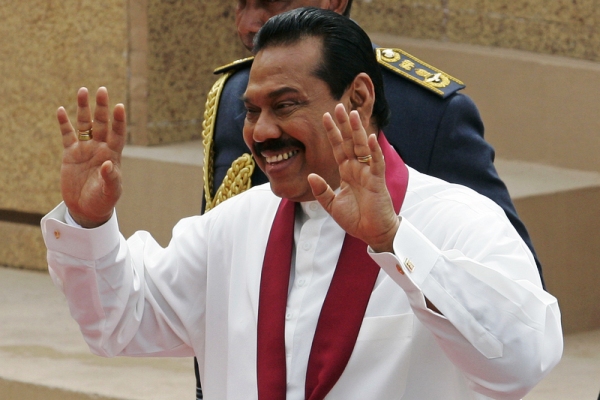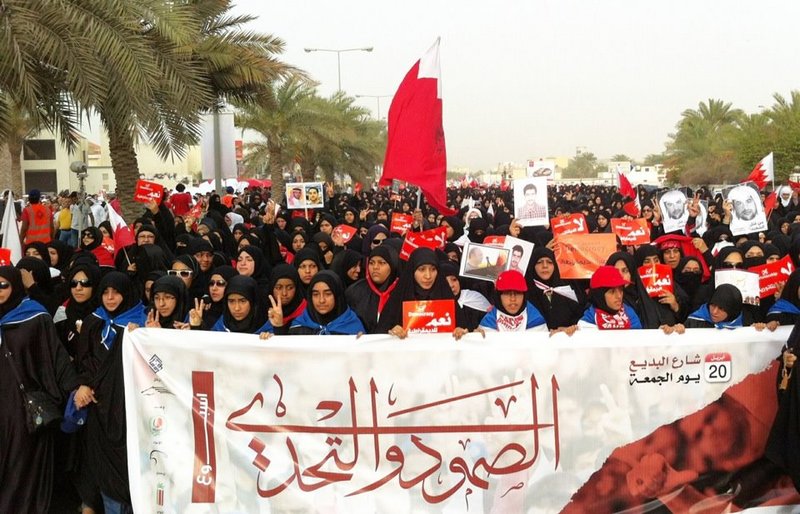Index relies entirely on the support of donors and readers to do its work.
Help us keep amplifying censored voices today.

President Rajapaksa claims his hands are when it comes to free speech. (Image Chamila Karunarathne/Demotix)
A Channel 4 News team was yesterday barred from travelling to the north of Sri Lanka by a group of angry protesters blocking their train. The pro-government crowd claimed that the reporters were getting money from the Tamil Tigers (LTTE). The crew were eventually escorted out by the police.
Channel 4 News editor Ben De Pear was live tweeting the ordeal. “It seems it is mob rule in Sri Lanka, albeit orchestrated by the authorities to prevent free press access to the north of Sri Lanka,” he posted at the time.
Channel 4 has angered the government of President Mahinda Rajapaksa with a series of documentaries and reports on the alleged of death of some 40,000 Tamils – the figured comes from the UN – in the last weeks of the country’s 30 year long civil war, which ended in May 2009. They have also covered subsequent allegations of human rights abuses like torture and disappearances, levelled at security forces. But De Pear tweeted Rajapaksa had said Sri Lanka is a free country, where you can “go anywhere”.
This comes on the day before the start of the Commonwealth Heads of Government Meeting in the capital Colombo. The biannual summit has been marred by coverage of the continuing poor state of fundamental human rights in the country, with Commonwealth members like India and Canada boycotting in protest. Britain, however, will be attending, with Prime Minister David Cameron stating it is better to confront the country than isolate it. Unlike MPs from Australia and New Zealand on a human rights fact finding mission, who were on Sunday detained and deported, he will presumably be able to enter the country. And with human rights not even on agenda to be formally discussed during the meeting, there are a number of recent issues the Prime Minister can raise in his “serious questions” to President Rajapaksa.
While what has happened to Channel 4 is unacceptable, it is nothing compared to the conditions local journalists work under. Since the murder of Lasantha Wickrematunge in 2009 and the disappearance of cartoonist and columnist Prageeth Eknelygoda in 2010 – neither properly investigated – the country’s media face ongoing repression under the Rajapaksa regime. While freedom of expression is protected in the constitution, little is done to protect it in practise. Intimidation is rife, with journalists attacked and beaten and printing presses destroyed. A recent example was the two-hour long raid on the home of editor and columnist Mandana Ismail Abeywickrema in August. She recently started a journalists’ trade union. Critical reporters have previously been labelled “traitors” by authorities, and at least 26 are currently in exile.
The regime also seems to have a problem with the right to free assembly and civil society gatherings. The vaguely worded 1979 Prevention of Terrorism Act is often used in government crackdowns. Only yesterday, families of disappeared people were barred by the military traveling to a candlelight vigil at an alternative Commonwealth meeting organised by human rights groups in Colombo. One of the conveners of the Alternative People’s Forum, Dr Nimalka Fernando, which is boycotting all official Commonwealth events, was subject to on-air threats from the Chairman of the Sri Lanka Broadcasting Corporation – a state owned radio station.
There is also the case of continuous allegations of torture and forced disappearances levelled at at government and security forces. A recent BBC report by Fergal Keane suggested that while repression has been taking place under successive governments, activists say the situation has worsened under the current regime. A priest who helps victims of torture in the country told the BBC “those who criticise or question the government are being silenced in a very brutal way”.
The government has denied all allegations of human rights abuses, with President Rajapaksa saying today that they ended the killing by defeating the Tamil Tigers. But with the Commonwealth “committed to the Universal Declaration of Human Rights” leaders have a responsibility to hold the Sri Lankan government to account. Hopefully David Cameron’s questions will indeed be serious.
 “Can we say that?” “Can we say that publicly?” Last night’s discussion at the Free Word Centre, marking 30 years of Channel 4, hinged on these questions. For the filmmakers, programmers, board members and legal department at Channel 4, these questions are also at the heart of their day-to-day operations.
“Can we say that?” “Can we say that publicly?” Last night’s discussion at the Free Word Centre, marking 30 years of Channel 4, hinged on these questions. For the filmmakers, programmers, board members and legal department at Channel 4, these questions are also at the heart of their day-to-day operations.
Chief Executive David Abraham’s opening words sketched an outline of Channel 4’s trajectory as “an irritant and a challenger to vested interest”. Without shareholders, state funding or fear of its commercial advertisers’ feelings, its editorial autonomy has brought it the trust of its audiences, Abrahams said.
Channel 4’s legal team, led by Prash Naik, are motivated by a presumption to publish. Line by line, shows are vetted and cleared before airing. “Can we say that?” Can we say that publicly?” It may be a struggle, but the default final answer is, rightly, “yes”.
Following Abraham’s speech, English PEN’s Jo Glanville brought together filmmakers Peter Kosminksy and Brian Woods, and media law silk Adrienne Page QC, to join David Abraham on stage.
The extortionate costs of defending a libel charge causes Adrienne Page to worry that media organisations will run scared from airing controversial material. In Brian Woods’ experience it can take years to find a home for shows addressing subjects like sexual abuse by teachers, or documentaries critiquing Islam. Though Channel 4 sometimes gets it wrong, last night’s discussion showed that the intention to provoke, stimulate and inform is still firmly part of their remit. Shocking and offending some of your audience might even be considered part and parcel of good television making. The only caveat, as Abraham put, is, “If you are gong to shock and offend do it for a purpose”.
The trend towards making more content available online, in shorter formats, with high levels of commentary and user interaction around each show, means the challenges to free expression will proliferate. Channel 4 has its own battles to fight in keeping television an essential vehicle for finding and challenging boundaries.
Eve Jackson is events manager at Index

Index condemns the arrest and deportation of foreign journalists covering demonstrations against the Bahrain Grand Prix this past weekend.
Three journalists from Channel 4, including foreign affairs correspondent Jonathan Miller, were arrested while filming a demonstration on Sunday. The arrest of the journalists, along with a local driver and prominent Bahraini human rights activist was reportedly “aggressive”.
Bahrain’s Information Affairs Authority (IAA) tweeted today that the journalists were in violation of “media rules” for entering the country without accreditation.
International media was given limited access to the country during the controversial race, as journalists from Sky News, Financial Times, CNN, and Reuters were denied entry. According to the Bahrain Centre for Human Rights, Japanese journalists from Asahi Newspaper were detained while covering protests. Local fixers and journalists are also under threat — photojournalist Mazen Mahdi claimed that police threatened to break his camera while covering a protest yesterday. Blogger and activist Mohammed Hasan was arrested and detained on Friday, and arrested once again Sunday with journalist Colin Freeman of the Sunday Telegraph. He was reportedly beaten during his initial arrest.
While the IAA has claimed that it allows the foreign media and workers to monitor ongoing unrest freely, this has not been the case. Journalists and rights workers were barred from entering Bahrain in the time leading up to the anniversary of Bahrain’s unrest, 14 February.
Bahrain should allow foreign media to have unfettered access to the country, and local fixers and activists should not be targeted for working with international journalists.
The editor of Channel 4 News and head of compliance at ITN both argued against statutory regulation of the press at the Leveson Inquiry this afternoon.
In a debate with Lord Justice Leveson, ITN’s John Battle expressed concerns over statutory regulation, noting that it was “quite a leap” from the current self-regulatory model, and suggesting a meeting point between the two.
Lord Justice Leveson argued that there were “all sorts of statutes that affect us, without affecting our independence”.
Chiming in with the evidence given by BBC Director General Mark Thompson and BBC Trust chairman Lord Patten earlier today, Battle argued that broadcasters were heavily regulated by the law, and that a state regulator of the press might “be left open to being viewed as not independent or not impartial”.
He called the current climate a “difficult and dark” period for the press, but reiterated the UK had a “strong tradition” of press freedom that needed to be maintained.
He added that he hoped there could be a regulatory system that could be viewed or considered by the press before being enacted.
Channel 4’s Jim Gray also said he was “anxious” about a heavy form of regulation for print media.
The Inquiry will continue tomorrow, with Index on Censorship CEO John Kampfner among those giving evidence.
Follow Index on Censorship’s coverage of the Leveson Inquiry on Twitter – @IndexLeveson